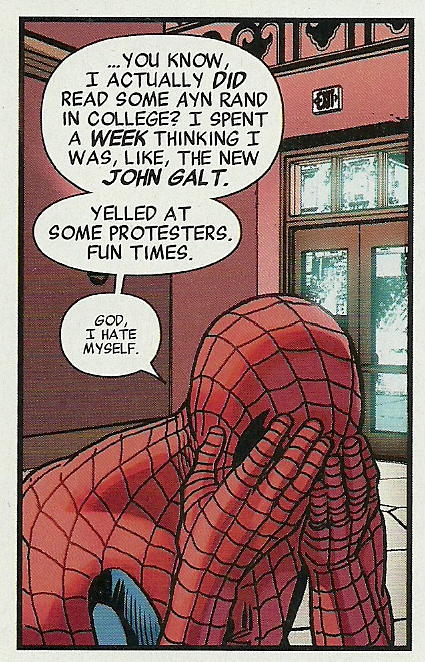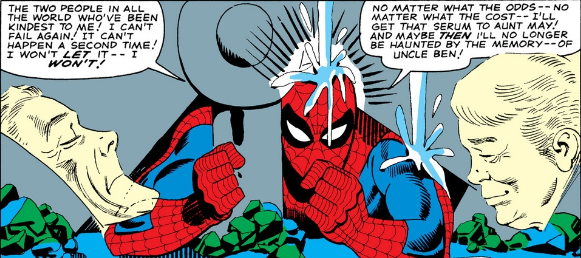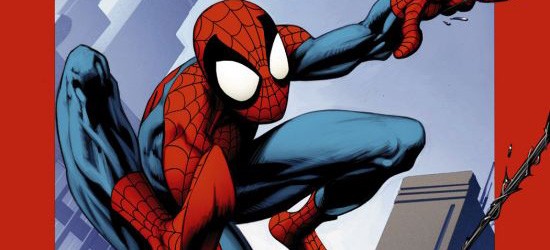The biggest news story of the year is the presidential election, and several recent Spider-Man comics have poked fun at modern politics, so it seems appropriate to consider how the institution has been depicted in the past.
The latest issue of Spider-Man/ Deadpool (a fill-in by Gerry Duggan and Scott Koblish ) received an A+ review from Eddie Edmends. The gimmick is that this was a lost comic from 1968, as unsavory plutocrats trying to sabotage a presidential campaign hired Deadpool and Mysterio to cause chaos at a political convention, which Peter Parker happened to be covering.

A speech made by a supervillain disguised as a politician features some references to modern political comments. The joke is that he’s saying stupid and outrageous things in order to end a political campaign, but that these are things that were said recently by actual politicians. “America First!” is a phrase used by the Donald Trump campaign, who also made sordid comments about his daughter, just as the pretend Jack McPherson made skeevy comments about his cousin. The comments about a wall to keep out the Mole Man is similar to things Trump has said about South America. Lest it seem that every comment be directly tied to the Republican candidate, the statement that Egyptian pyramids weren’t crypts is based on something Ben Carson—neurosurgeon and former presidential candidate—said about pyramids being used to store grain.

Later in the issue, Deadpool advises the evil one percenters to use their money more wisely; instead of hiring supervillains to cause a ruckus, they should just buy politicians.


A recent Spider-Gwen Annual featured a version of MODOK who resembled Donald Trump. This got coverage in mainstream media, including write-ups in the Daily Beast, and Entertainment Weekly. It also got an A+ review on the Crawlspace, this time by Javi Triujilo, although he doesn’t cover the satire, which was ultimately a small part of the comic. A recent development in the adjectiveless Spider-Man title has been the public’s discovery that the new Spider-Man is black, and one issue featured Tony Stark trying to get Miles Morales on his side when it comes to the major conflict in Civil War 2.
Politics was an even bigger part of the comics during the 2008 election. One of the best-selling Spider-Man comics of the last few decades was a team-up between Spider-Man and President Barack Obama, a back-up story created due to the media attention of the President being a fan of the wallcrawler. The larger arc in Amazing Spider-Man at this time featured a mayoral election between two individuals from ostensibly unidentified political parties. One was an African-American city councilman, and the other was a shady middle-aged white male businessman, so they do fit stereotypes for existing parties. Granted, no one ended up looking good in this particular election, as the businessman was exposed as running sweatshops, and the councilman’s daughter turned out to be a supervillain. J. Jonah Jameson ended up elected mayor of the Marvel Universe’s New York, but this was as an Independent, which avoids partisan implications. This is a column about politics in Spider-Man comics, and I’m glossing over a plot development in which a major supporting character became an elected official, although that’s mainly because the material is rich enough for a later column, and this one’s long enough as is.
Shortly afterward, in the American Son storyline, Joe Kelly suggested that Peter Parker was quite happy to see President George W Bush get replaced by Barack Obama. That’s hardly unique for a twenty-something New Yorker. Although it did show how rare it is for the series to actually address political beliefs, since Peter Parker isn’t depicted as expressing his political views very often in the book.

In one of the earliest political references in Spider-Man comics, Peter came across a protest. He was largely dismissive of their concerns, although this might have been due to artist and co-plotter Steve Ditko. Peter would be more sympathetic towards protesters later in Stan Lee’s run.

In Captain America & the Mighty Avengers #1, writer Al Ewing suggested that other stuff was going on in Peter’s life at this time.

As a Republican, I’m slightly wary of depictions of politics in popular culture, due to the left-leaning slant of most writers and editors. Some writers seem unaware that those on the other side truly believe that their solutions will do more good than the alternative. It’s easy to demonize the people you disagree with because the stakes are high, and mistakes in policy will mean that some people will die and that others will never be achieve their true potential. But functioning in a pluralistic society requires civil interactions with people who honestly believe that if everyone who thinks as you do would only come to their side, the world would be a much better place.
Given all the times elected officials, political candidates and political issues are mentioned on the front pages of newspapers, politics should probably be a bigger part of the Spider-Man comics than it is. However, there are incentives for Marvel employees to avoid taking political stands in the pages of the comics. Readers will hold myriad irreconcilable political views (Ted Cruz is right! Elizabeth Warren is right! Ted Cruz is right on some things, and Elizabeth Warren is right about other things! Ted Cruz and Elizabeth Warren are both wrong!) in addition to those who don’t vote, or don’t participate in politics in an American context. This complicates matters for anyone trying to deal with serious topics in a series that is meant to be set in a world that is similar to our own.
As a result, when controversial topics are brought up, it’s usually as a way to raise questions rather than provide answers, or to present an extreme version of a situation which doesn’t really address anything about contemporary debates. Readers could disagree on gun control, but we’ll hope that Spider-Man can save schoolchildren from a shooter. There may be disagreements on the role of churches in family life, but there’s a general consensus that cults are bad. Religion and politics can always be incorporated into the A-plot, since ministers, rabbis and politicians can always be attacked by criminals, and rescued by superheroes. However, there is a tremendous potential for intellectual dishonesty, as the writer gets to determine the outcomes on issues that are usually much more opaque in real life. A conservative writer could depict a voter fraud conspiracy by crazed environmentalists, while his liberal counterpart could pit Spidey against Republicans introducing drugs to a primarily African-American neighborhood.
When a politician appears, Spider-Man generally respects the office, which is a bland and inoffensive position to take, and not a neutral one. Often the officeholder’s role is nonpartisan. Sometimes a real-life political figure offers advice on how to avoid drugs, or how to find help if you’re unemployed. If a fictional official abuses his power, it’s not meant as an ad hominem attack on all politicians or against all members of a particular political party. We would all agree that it’s not acceptable for a city councilman to take bribes from the Kingpin, or for a district attorney to order a witness killed. There are obvious exceptions, due to occasional parodies, although there is always the possibility that a writer will have a tremendous blind spot, and be ignorant of the appeal of a political figure they’re mocking, which can turn off some readers.

The publication format makes it difficult to depict contemporary controversies. It takes a few months to publish a comic book, so any discussions about today’s news events can end up quite dated. What was timely when the writer began work on the issue might be forgotten a few months later. This might be one reason political references occur in shorter tales (a fill-in issue, and two back-up stories) as the turnaround from concept to publication is briefer.
Spider-Man’s adventures will continue to be published for generations. Due to the sliding time scale, stories that were published decades ago are described as occurring a few years ago. Something that was contemporary can quickly become anachronistic. There are some examples from Howard Mackie’s run. The opening of Peter Parker Spider-Man #95 was essentially an ode to Mayor Giuliani, and praise for his program to get guns off the street. The first review I found for this issue was also a perfect grade, so at the moment this continues the correlation between politics and high reviews.

In case you weren’t clear on how you were supposed to feel about the mayor, Kingpin respects him as a likely adversary.

Mackie’s final issue (the Amazing Spider-Man 2001 Annual) included a reference to the 2000 Florida election. And the correlation between political references and positive reviews ends.

Bill Willingham, the writer of Fables and a few DC Universe books, was asked in an interview about how he depicts politics in his work. His view was that critics will only notice views they disagree with.
I don’t think Fables is that political, except for many, many comics are that political. There are things in the comics mainstream that just astound me that they go by without comment. I think part of the reason is that a fish doesn’t really notice the water he’s swimming in. So you can have these left-of-center diatribes throughout and never get a murmur and just mention one thing that’s more to the right of center and suddenly be shocked by it because you just don’t notice the waters you swim in.
In a response on his Tumblr page, Brian Michael Bendis talked about how he thinks politics should be depicted. The typos are his own.
I personally don’t have a hard time understanding politics, I don’t like it but I understand it :-), but I do know that as a reader I don’t like being lectured to by the writer. the biggest mistake I see with any kind of politics in any kind of literature is the lecture. the lecture to the converted.
I do like being informed and being shown something that I know to be accurate even as it illuminates things to me that I didn’t know. or thought I knew.
the West Wing on its best day, though liberally bent, was very good at having smart people talking about smart things with many sides shown. including the often complete failure of politics as the governing body. but that show was about politics so he could get away with a lot more than I would tolerate from a lot of other places.
my suggestion to you is try to write something that is the opposite of how you personally feel about something. finds someone or someone’s that feel the opposite of you and really talk to them and try to find their side of the argument. I often write about things that are the opposite of how I personally feel because I’m trying to understand them.
but do not lecture!!!
There is another view that making the comics explicitly partisan will be more effective at getting sales and attention. Due to the sales figures, this isn’t an industry in which being inoffensive is a viable strategy, so you need something that makes this a title that some people want to buy. Its worth pissing off millions of Fox News viewers or Huffington Post readers if it can get 70,000 people to pick up the comic. This has great potential to draw new readers to the hobby, even if tens of thousands of long-time fans will leave, or go to titles that fit their interests. In Supergods, Grant Morrison noted that this was pulled off in the 1970s.
The semiunderground hippie superheroes of Englehart, Starlin, and writer Steve Gerber has one thing in common. They could and would fight to defend what had become the Marvel house philosophy: a kind of college-liberal morality that even with a new cynical edge never lost sight of the essential ideals of heroic self-sacrifice that powered the Marvel Universe.
What works for a B-lister might not be the best approach for Marvel’s flagship heroes. I do have a wimpy compromise of how to deal with the character’s political beliefs. My take on it is that Peter Parker has never had the time to become informed about politics. For the last decade, he has had to balance work, school, his social life and his difficulties as Spider-Man. So he hasn’t had time to read The New Republic, or National Review. I admit that this option may bother the readers who expect all Americans to be informed members of the electorate, and there is also the point that someone who worked in journalism for a decade as Peter Parker did would probably have some major partisan opinions, but it has the benefit of restricting anyone from using a fictional character’s beliefs to bolster their own arguments. .
What do you guys think? Should comics try to be apolitical? How should comics handle something that is a significant part of the world? What should Peter Parker’s political positions be? And while I don’t pretend to have a complete list of every Spider-Man comic that touches on politics, are there are any examples you like that I skipped?










Hi admin i see you don’t monetize your site. You can earn additional $$$ easily, search on youtube for: how to earn selling articles
Pete’s definitely a liberal, not sure how any other conclusion can be drawn.
Super hero comic books are not supposed to be about politics imho. If I wanted to read about politics I would buy comic books that specifically deal with that. I don’t mind when they mentions stuff that’s going on (even if it dates the comic book) as long as it’s done tastefully and it’s historically significant. Like Stan Lee mentioning the protests, Vietnam War, that other War, Giuliani, etc… I agree 1000% with Bendis wrt not be preachy. If I want a writer’s political opinion, I would stalk their twitter account. I don’t want it in my comic books. I hate it, even if I agree with it. By trying to write about what you don’t believe in is a good way to avoid the trap of lecturing the reader. How can you lecture if you don’t believe in it?
“The comments about a wall to keep out the Mole Man is similar to things Trump has said about South America” Trump’s wall is for the US/Mexico border; Mexico is in North America.
“Your cousin likes Lawrence Welk.” Too bad this insult never caught on.
Ah, the late 90s, when Rudy Giuliani was someone to be respected. Too bad he turned into a raving lunatic that mentions 9/11 every 5 seconds no matter what he’s talking about. I thought his RNC speech was going to turn into that scene from Scanners.
Personally, I think comics should not include political beliefs unless they are necessary to the plot. I’d guess that 99% of all Spidey stories don’t include anything about a political belief and they aren’t lacking for it. Readers from both parties can read those stories and not find anything that offends them personally. Why bother including something for a quick laugh that could offend up to half of the readers, and will likely be dated in a year? (does anyone think “hanging chads” are still funny?)
(The one exception, of course, is Trump, who deserves all the mockery that is possible. It’s both funny and scary watching half of your country go insane. Good luck!!!)